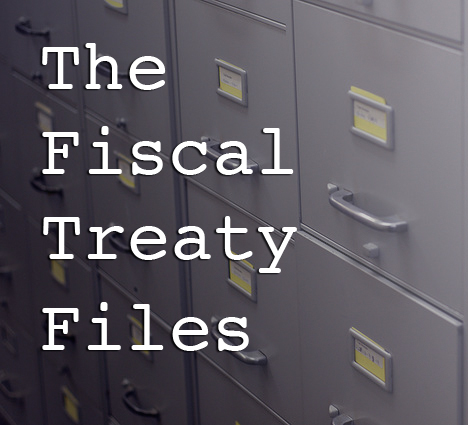The Fiscal Treaty and its scapegoating clause

The historical basis of the Fiscal Treaty lies in German ordo-liberalism - a strand of thought which tries to make the market free by doing away with the unpredictability of politics. By Tom Boland.
So far, many commentators have drawn attention to two aspects of the Fiscal Treaty that is subject to referendum in Ireland on 31 May.
First of all, there is the economic prescription for austerity under the guise of the insistence of a structural deficit of no more than 0.5%. While keeping deficits under control is sometimes important, what this basically does is to rule out Keynesian stimulus spending. Sure, the state should balance its books and save during the good times, but the counterpart to that, which is the state leading the economy out of recession through large projects of public infrastructure in the bad times, is outlawed. There can be no ‘New Deal’ under the Fiscal Treaty. Alongside this there is the requirement to reduce debt to GDP ratios to 60%, by 1% per year if the ratio is high, but only 0.5% if not so bad. In either case, there is a penalty for those who are in trouble. The Fiscal Treaty makes right wing policies constitutional – making a democratic mandate unnecessary.
Secondly, the Fiscal Treaty represents a loss of sovereignty: fiscal policy - the setting of budgets by the elected representatives of the state - is now a European concern. In an interconnected European economy, this might make sense, but only if each state benefited by compensation – for instance by the issuing of Eurobonds, which would cut our borrowing rates down to 2%. Or collective responsibility for bank bailouts!
Here I wish to draw attention to another aspect. The Fiscal Treaty sets rules for which there are punishments (deviation from the 0.5% and 60% as outlined above). The punishment is a fine of 0.1% of GDP, which for Ireland would come to over €100 million. According to Article 3 of the Treaty “a correction mechanism shall be triggered automatically”. Such a phrase gives the impression that there is a scientific certainty in measuring structural deficits or debt to GDP ratios – there is not; economics is a matter of debate.
In Article 7, the fiscal treaty goes on to outline more precisely the ‘correction mechanism’ – first of all the matter shall be judged by the European Commission; a body whose democratic mandate is small. However, it does go on to suggest that the correction mechanism (fine) will not apply where a qualified majority of Eurozone states are “opposed to the decision proposed or recommended”. Thus, if you have enough allies, you can avoid the fine.
Beyond this, Article 8 goes on to outline that Contracting Parties (states) can also accuse each other independently of the European Commission and “bring the matter to the Court of Justice”. So, even if the European Commission validates the state’s fiscal policy, another state can seek out a punishment if they perceive the necessity for a ‘corrective mechanism’!
What does this add up to? In effect, if a state has the support of its fellows, it need fear no fine. If a state wishes to bring another before the Court of Justice, it may do so, again unless the state has enough friends to oppose the proposal. As such, this ends up being justice or punishment by majority rule, which approaches mob justice or scapegoating. If one isolated country breaks the rules, it can be punished by the others. Democracy is appropriate for deciding on representation and legislation, but not for administering justice. Similarly, the Court of Justice is an inappropriate instrument for deciding matters of economic significance.
Understanding the Fiscal Treaty - Ordo-liberalism
Clearly, the Fiscal Treaty is immensely inadvisable. However, beyond abhorring it and campaigning against it, it is worthwhile trying to understand it in historical context. German ordo-liberal thought underpins the idea of the treaty - a strand of thought which emerged during WWII.
Ordo-liberalism is not simple laissez-faire economics. Rather, it is a form of governing which stresses the importance of the state as the guardian of the market: “The attitude of the liberal towards society is like that of a gardener who tends a plant in order to create the conditions most favourable to its growth must know as much as possible about its structure and the way it functions” (Fredrich Hayek, The Road to Serfdom, p. 18). Such an attitude towards society emerged in the Enlightenment according to Zygmunt Bauman, and informs both left and right, and especially those who wish to govern through economic science – believing such a thing is possible.
Hayek and others (Lippman, Ropke, Ruskow, Eucken etc) were reacting against Nazism, which made the state the autocratic planner of the economy. They saw planning as the road to despotism and totalitarianism. Ordo-liberalism challenged the authority of the state: “It is a sort of permanent economic tribunal confronting government” (Foucault, The Birth of Biopolitics, p. 247). And, after WWII a strong state was unthinkable in Germany – so participation in the market became a surrogate for citizenship; perhaps parallels can be drawn to the contemporary situation in Europe.
Interestingly, ordo-liberalism considers the market as a sort of game, whose rules should be set legally, and subject to as little state intervention as possible. As Ropke urges “...the law courts should be made organs of national economic policy, and that they should be given jurisdiction over matters which up to now have been left to the administrative agencies.” (The Social Crisis of our Time, p. 193). Hence, ordo-liberalism leads to the setting up of entities such as the ‘Competition Authority’ (is that an oxymoron?), and of course, a fiscal treaty which renders fiscal policy a matter of obeying rules with recourse to a Court of Justice for infractions.
One of the arguments in favour of such policies and the Fiscal Treaty is that it would save us from poor politicians. To an extent this is true, yet what if the experts who make the rules or the court who sits in judgement on them are fallible? Ultimately, the impulse of ordo-liberalism is to make the market free by doing away with the unpredictability of politics. Such a ‘perfect world’ cannot be achieved, and might well end up as a nightmare.
Ordo-liberalism is a critique of state intervention as the imposition of the political vision of an individual or group. Such a critique assumes that groups who seize political power always work selfishly in their own interests; unmasking all those who pursue the ‘public good’ as either delusional or cynical. The unpredictable, even unfathomable arena of the market is supposedly the solution, so that individuals can reach agreements and bargains through personal choices. Only when individuals’ desires are released from all regulative fetters are they truly free.
The Fiscal Treaty represents an expansion of ordo-liberalism; not only is state planning and regulation critiqued, but the very possibility of spending to these ends is reduced with punitive sanctions from the Court of Justice. Yet what of the scapegoating clause, which we observed earlier? One of the weaknesses of appealing to legal mechanisms to stymie state intervention within a single economy is that legislation is set by democratic representatives, who - in the suspicious minds of ordo-liberals – are self-interested interferers in the market. By leaving the authority for the sanction in the power of other states, this acts again to cut out the supposedly malign influence of national politicians on policy. Those outside, perhaps ‘detached’ from the problem will see more clearly that the rules must be followed, and punishments applied for infractions.
As a final reflection, it is worth contemplating that our politics is increasingly dominated by schools of thought which are actually anti-political, preferring pseudo-scientific economics to actual leaders. If a populace votes for an ordo-liberal party, certain policies will ensue, and judgement will be made at the next election; fine. What is most objectionable is the attempt to replace the democratic test with an economist’s slide-rule. {jathumbnailoff}
Tom Boland lectures in Sociology at Waterford Institute of Technology.
 This article is part of our Fiscal Treaty Files series. For more of our coverage of the Fiscal Treaty click here.
This article is part of our Fiscal Treaty Files series. For more of our coverage of the Fiscal Treaty click here.
Image top (European Court of Justice, Luxembourg): Gwenaël Piaser.
